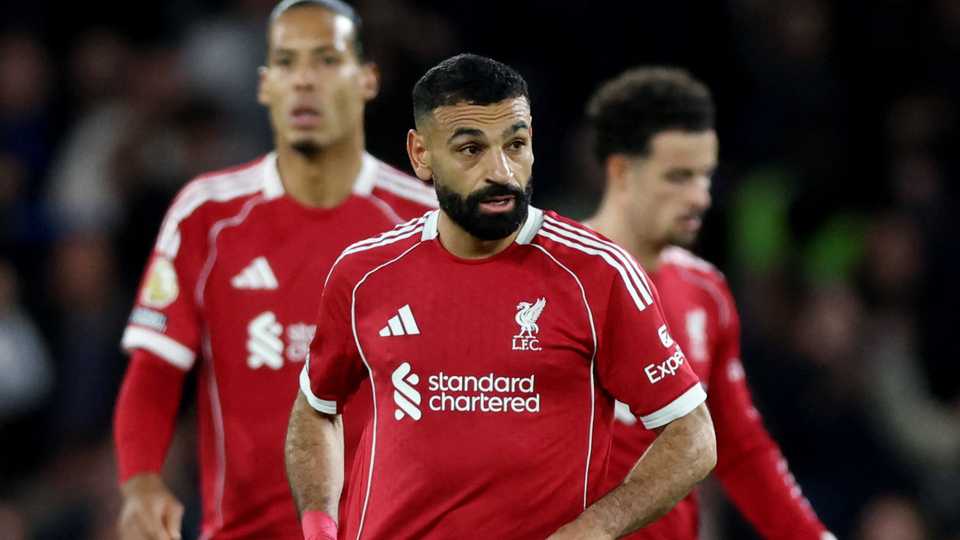Goes pretty well’ – 9/10 Liverpool ace suggests he wants Mohamed Salah role after breaking 47-year record

Mohamed Salah has been a symbol of goals, power, and magic for Liverpool since he first stepped into Anfield. His left foot has written history, broken records, and turned quiet nights into unforgettable roars. But this new season has not started like the ones before. The Egyptian King, once untouchable and unstoppable, now looks like a man searching for his rhythm again. He is still scoring, still assisting, still trying, but there’s a strange silence in his steps, a rare hesitation that fans can see and feel. It is not about numbers anymore; it is about that invisible spark that made him the face of Liverpool’s dominance. And now, as Salah battles his own form and critics, a new challenger has quietly risen from within the team—Cody Gakpo, the Dutch forward who just broke a record that had stood for forty-seven years.
Gakpo, 26, went away on international duty for the Netherlands and returned with not just goals but confidence, energy, and headlines. Two goals and one assist against Malta might sound ordinary, but the story behind those goals made everyone talk. Both came from the penalty spot, and both were taken with calmness that reminded many of prime Salah. In that single night, Gakpo became the first Netherlands player since Rob Rensenbrink in 1978 to score two penalties in one game. He didn’t just score; he commanded the stage like a man who wanted to say, “I can do this at Liverpool too.”
The moment he walked off the pitch after the 4–0 win, the cameras followed him. Reporters asked the question that every Liverpool fan had in mind—why doesn’t Gakpo take penalties at Liverpool? His answer was honest, almost playful, but it carried a message. “At Liverpool, I’m never allowed to take them,” he said with a smile. “But normally, I’m pretty good at it. I’ve only missed one penalty in my career. That was for PSV against Copenhagen.” The words “I’m never allowed to take them” hit differently. It wasn’t arrogance; it was quiet confidence, the kind that tells you a player is ready for more responsibility.
The Dutchman’s performance earned him a 9.5/10 rating from FotMob, a near-perfect score, and even his teammates back at Liverpool couldn’t ignore what he had done. Salah is the undisputed first-choice penalty taker at Anfield, and for years, no one dared to touch that duty. Even when Darwin Nunez or Dominik Szoboszlai were fouled, the ball always found its way to Salah’s left foot. He was the king of the spot, the man who turned pressure into points. But football is built on moments, and this might just be one of those moments where the tide begins to shift slowly.
Salah, at 33, is still the face of Liverpool. He just came off one of the most remarkable seasons ever seen in the Premier League—29 goals, 18 assists, and the rarest achievement of all: winning the Golden Boot, Playmaker Award, and Player of the Season in the same campaign. He even finished fourth in the Ballon d’Or voting. But like all greats, every mountain has a plateau. This season, he has three goals and three assists in ten matches. Not bad by normal standards, but Salah is no normal player. The problem isn’t numbers—it’s his sharpness, his finishing touch, the fear he used to create in defenders. At times, he looks tired, other times frustrated, and occasionally, just unlucky. And as Salah tries to rediscover his flow, Gakpo is quietly climbing.
Arne Slot, the new man in charge, knows the energy inside the camp is shifting. He inherited a squad that still carries the soul of Klopp but is looking for a new rhythm. Gakpo has become one of the players defining this new rhythm. He isn’t loud, he isn’t flashy, but he’s efficient. When he plays through the middle, he connects everything. When he drifts to the left, he opens spaces. Now, after his performance for the Netherlands, he’s showing that he can also handle the spotlight—the kind that comes with being the man who takes penalties in high-pressure moments.
Gakpo’s penalty record is impressive. Eight scored, one missed. That’s an 88% success rate. Salah’s record? 54 scored, 11 missed—about 83%. Statistically close, but for Gakpo, it’s about opportunity, not comparison. He has never really had the chance to be the one trusted from the spot in red. The only time he took a penalty for Liverpool in regular play was in the Champions League against his former club PSV—a 3–2 loss that still stings but a moment he handled with class. He also converted in the Community Shield shoot-out against Crystal Palace earlier this season. Small samples, but they show readiness.
In modern football, penalty-taking is not just a skill; it’s a symbol of leadership. It’s about trust. When the whistle blows and the entire stadium holds its breath, the man who steps up carries the weight of millions. Salah has done it countless times. Burnley away this season—93rd minute, tension in the air, and Salah buried it. That’s the kind of nerve that builds legends. But the question now floating around Anfield is not whether Salah can still do it—it’s whether he will always be the only one allowed to do it.
Slot, who values collective energy over individual fame, might just see Gakpo’s confidence as something worth nurturing. The Dutch manager is trying to build a Liverpool that can survive beyond Salah, beyond Van Dijk, beyond the golden era that began in 2018. He wants a team where leadership is shared, where moments of glory belong to many. Gakpo fits that vision perfectly. Calm, intelligent, versatile, and now, hungry for bigger roles.
Inside the Liverpool dressing room, things remain respectful. Gakpo admires Salah deeply; Salah respects Gakpo’s rise. There’s no tension, just healthy competition. But competition at the top level always sparks evolution. Salah once came to Liverpool to replace Philippe Coutinho’s creativity. Now, someone might be coming for Salah’s responsibility. It’s the natural circle of football life.
Fans have started to talk about it online. Some say Gakpo should be given chances when Salah is off the pitch. Others argue that Salah has earned his right to keep taking penalties until he decides to stop. A few even dream of seeing Gakpo take one in a crucial Premier League match, maybe when Salah is substituted or injured. For now, it’s just talk, but talk at Liverpool has a way of becoming reality faster than people expect.
The Dutch forward’s confidence is no accident. Since his move from PSV, he has evolved. Under Klopp, he was a learner, adapting to the Premier League’s intensity. Under Slot, he’s starting to express himself more freely, like he does with the Netherlands. His link-up play, his awareness, and now his penalty-taking confidence all show a player entering his prime. Every great team needs players who step up when others fade, and Gakpo looks ready to do that.
For Salah, it’s a reminder that football never stops moving. The man who once dethroned the old guard at Liverpool now feels the next generation breathing behind him. But knowing Salah, this kind of challenge might just light another fire. He’s a competitor who thrives on proving people wrong. The criticism, the questions, the whispers—they all fuel him. Maybe this small story about penalties will wake up another version of Salah, one that will go on another crazy scoring run.
Arne Slot now has a fascinating balance to maintain. On one side, he has Salah—the record-breaker, the king of consistency, the man who has made Liverpool believe in miracles. On the other side, he has Gakpo—the quiet assassin, the player growing in confidence, breaking records for his country, and asking for more responsibility. Slot must manage egos, ambitions, and timing. Giving Gakpo more chances could boost competition; taking penalties away from Salah could upset the team’s balance. But if Slot wants a Liverpool that stays strong after the legends fade, he must start trusting the new blood.
The idea of Gakpo taking penalties at Anfield might sound small, but it symbolizes something bigger. It’s about transition. The same way Van Dijk’s leadership is slowly being shared with Szoboszlai and Mac Allister, Salah’s influence will one day pass too. Gakpo stepping forward with confidence is part of that story. And in football, stories like this often become defining chapters.
For now, Salah remains Liverpool’s penalty king. When he steps up, fans still expect the net to shake. His record speaks for itself—he’s scored in Champions League finals, decisive league games, and title races. But maybe, just maybe, in a domestic cup game or a Europa League night, Slot might hand Gakpo the ball and say, “Go on, show us.” And when that day comes, Gakpo won’t hesitate.
He’s already shown the world that he can handle the pressure. In international football, wearing the orange of the Netherlands, he stood on the penalty spot twice in one night and delivered both times. The entire stadium knew he was ready. Now, Anfield might soon get its own taste of that calm Dutch precision.
Salah’s story is far from over. Legends like him never fade quietly. They fight, they adapt, they reinvent themselves. But every legacy needs a successor, someone who learns, waits, and eventually steps up. For Liverpool, Cody Gakpo might just be that man—not as a replacement, but as a continuation of greatness. A reminder that while one chapter ends, another always begins.
The international break will soon end, and the lights at Anfield will shine again. The fans will sing, the banners will rise, and Salah will lead them out once more. But somewhere behind him, Gakpo will be walking with a new confidence, knowing that his time is coming. Maybe not tomorrow, maybe not this season, but soon enough, he will be more than just a supporting player. He will be one of the pillars of Liverpool’s next era.
Football is never just about who scores or who assists; it’s about the quiet shifts that shape the future. Salah once arrived to challenge Sadio Mane’s dominance. Now, Gakpo’s ambition to take over the penalty role is another echo of that same competitive spirit that built Liverpool’s modern empire. The king still reigns, but a new prince is waiting, smiling, ready for his moment under the lights.
Because at Anfield, the throne is never empty—it is earned, every single time















